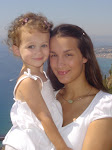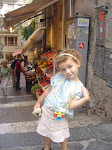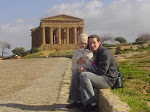Given the time and resources necessary to travel anywhere in the world to undertake an ethnographic research project would take me back to Sicily. Although I lived in Sicily for three years, after learning about ethnography and folklore, I feel I missed a lot of Sicily’s history that is not necessarily told by a tour guide or written in a book. The area of interest to study would be the folklore behind the mafia, which holds great power on the island and over the Sicilians. Although the folklore surrounding the mafia would be interesting, I do not think it wise to explore. So with that said, I would focus my ethnographic research on the folklore of Mt Etna.
Mt Etna is Europe’s largest, active volcano. When first moving to Sicily, my family and I rented a villa located in Nicolosi, often called the Gateway to Etna, because of its location on the base slopes of the mountain. Upon moving into the villa we did our research on the internet and asked many questions on the possibility of an eruption during our stay, the answers were of no worries. We took many drives up the mountain to enjoy the view and to also see the ruins of the past eruptions. As crazy as it may sound when saying it and I am sure reading it, we thought it exciting to see and to live on the slopes of an active volcano.
After reading chapter seven I realized there were many accounts of folklore right in front of my eyes and ears but I was unaware of what I would want to know in the future. Now, I feel I missed an opportunity to gather information to suffice my curiosity and questions of today. Thinking back on my time in Sicily, at times I feel I was simply a tourist living in another country for three years and did not take advantage of the time I had there. Don’t get me wrong, I traveled, took many great pictures, saw and did many things I otherwise would not have had the chance to do. But by the questions I have now, I feel I did not ask as many questions while I was there, or immerse myself into the culture as I should have.
If given the opportunity to undertake an ethnographic research project, I feel I now have the proper tools to embark upon a journey of gathering much desired information. Chapter seven states the basic steps and process of fieldwork which would serve as a guideline while in the field. Within the basic steps page 206 lists the tools, aside from ones “natural tools”, needed to aide in attainment of information. Aside from the great tool list, the chapter also emphasizes on developing good questions to ask and how to properly listen.
After missing the opportunity of immersing myself, ethnographically speaking, while in Sicily, I have thought of the ways in which I would go about accomplishing my fieldwork. First, I would become fluent in the local language, not learn just enough to get by, my first mistake. I think language is the key barrier in learning local costumes and ways of living. I managed to get along quite well without being fluent in Sicilian or Italian, but know I missed out on a lot. Also, I would interview, with my tools, the locals living in Nicolosi and also the people who live, refusing to leave, further up the mountain. There is also a site located, as far as a car is able to drive, atop the mountain where my family and I would go to have hot chocolate and buy Mt Etna memorabilia in the small cabins situated there for tourists. There, the people of the shops and serving hot chocolate would surely have a few stories to share. Also the larger city of Catania, which has been the brunt of eruptions, would be an ideal area to gather information. I would interview the older community as well as the younger, and compare the folklore that has been passed on throughout the years.
Completing this ethnographic research would be worth doing, because I feel it would be self fulfilling. This project would allow me to answer the many questions of who, what, when, where and how that I have now invoked throughout my learning of ethnography, fieldwork and folklore.
“This blog entry is my response to the chapter seven reflection
question.”
Sims, Martha C., and Martine Stephens. Living Folklore An Introduction to the Study of People and Their Traditions. Logan, Utah: Utah State University Press, 2005.
Sunday, December 9, 2007
Subscribe to:
Post Comments (Atom)








1 comment:
well done
Post a Comment